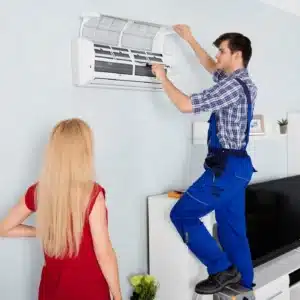Importance of HVAC Maintenance for Commercial Buildings
In Florida’s hot and humid climate, HVAC systems are essential...
The term “indoor air quality” (IAQ) describes the standard of air in buildings, homes, and other enclosed areas. IAQ is characterized as the extent to which a building’s air is free of toxins that could harm the health and well-being of its residents. A variety of health conditions, from simple annoyances like headaches and eye irritation to more serious issues like respiratory illnesses, can be brought on by poor IAQ.
Several indicators, including the concentration of pollutants like carbon monoxide, radon, volatile organic compounds (VOCs), and particulate matter, are used to evaluate and manage IAQ. To promote health and well-being, having a professionally installed HVAC system can significantly improve your IAQ.
IAQ can be impacted by a number of factors, such as:
Indoor Pollutants: This includes the gases, particle matter, and other substances that furniture, building materials, and appliances may emit. Examples include dust, carbon monoxide, nitrogen oxides, and volatile organic compounds (VOCs).
Outdoor Pollutants: Building ventilation systems, open windows, and doors are all entry points for outdoor contaminants. Pollen, mold spores, and vehicle exhaust are a few examples.
Humidity: Low humidity can make the air feel dry and irritate the respiratory system, while high humidity can encourage the growth of mold and bacteria.
Ventilation: While excessive ventilation might result in energy waste, inadequate ventilation can cause a build-up of indoor contaminants.
Temperature: Uncomfortable extreme temperatures can also have an impact on the quality of the air indoors. Low temperatures can encourage the growth of mold and germs, while high temperatures can enhance the discharge of pollutants.
Occupant Behavior: IAQ can be impacted by occupants as well. For instance, using certain cleaning supplies, smoking indoors, and cooking with gas are all possible sources of indoor air pollution.
Maintenance: IAQ can be improved by performing routine maintenance on appliances and HVAC systems to stop the accumulation of pollutants.
To achieve good indoor air quality, several measures are used to increase ventilation and minimize pollution sources. This includes:
Source Control: Determine and eliminate the sources of indoor pollution. Using natural cleaning supplies, keeping HVAC systems in good working order, refraining from smoking indoors, employing adequate ventilation in kitchens, and reducing the use of chemicals and other pollutants inside can all contribute to this.
Ventilation: In order to maintain appropriate IAQ, enough ventilation is essential. This entails ensuring that buildings receive a suitable amount of clean external air and that air is adequately circulated throughout the structure. This can be accomplished by combining mechanical ventilation systems, such as HVAC systems that deliver fresh air into the building, with natural ventilation methods (such as opening windows).
Air Cleaning: Air purifiers and other air cleaning technology can assist remove airborne contaminants, but they shouldn’t be the only means of achieving acceptable IAQ.
Regular Cleaning: The indoor air quality can be considerably improved by regularly cleaning surfaces like floors, walls, and ceilings to help decrease dust, mold, and other contaminants.
With years of experience in HVAC installation, maintenance, and repair, Kyzar Air Conditioning offers expert services in Palm Beach and Martin County, Florida. We specialize in IAQ, with a range of services designed to ensure that your air is clean, and your HVAC runs smoothly.
Call us now at 561-640-1000 to learn about our IAQ solutions.
Disclaimer: All content on this website is intended for informational purposes only. We discourage anyone from attempting to repair, replace, or maintain HVAC systems without the help of a licensed, insured HVAC technician.

In Florida’s hot and humid climate, HVAC systems are essential...

Florida’s warm climate brings many advantages, but it also means...

When it comes to keeping your home comfortable in Florida’s...

In Florida’s hot and humid climate, a reliable air conditioning...

If your air conditioner has been chugging along since the...

Indoor air quality is a big deal, especially in commercial...